-
 10 min. read
10 min. read
-
 Trevin Shirey
Trevin Shirey VP of Marketing
VP of Marketing
- Trevin serves as the VP of Marketing at WebFX. He has worked on over 450 marketing campaigns and has been building websites for over 25 years. His work has been featured by Search Engine Land, USA Today, Fast Company and Inc.
The United Kingdom voted in a highly-charged referendum to leave the European Union on June 23. The referendum was called “Brexit,” short for “British exit.” Already, the world is starting to feel the effects as the British pound hits a 30-year low, the price of gold skyrockets, and the Scottish, Welsh, North-Irish, and English frantically search Google for information. For the record, we’ll only look at trends from the four nations that make up the United Kingdom: England, Wales, Scotland, and Northern Ireland. We’re not looking at independent Ireland or any small island regions in the surrounding area (like the Isle of Man). Here’s what we can learn already from the aftermath of Brexit.
Point #1: People make world-changing votes without all the information
One of the biggest critiques about Brexit is that the people who voted didn’t fully understand what it meant. And according to Google, that’s kind of true. 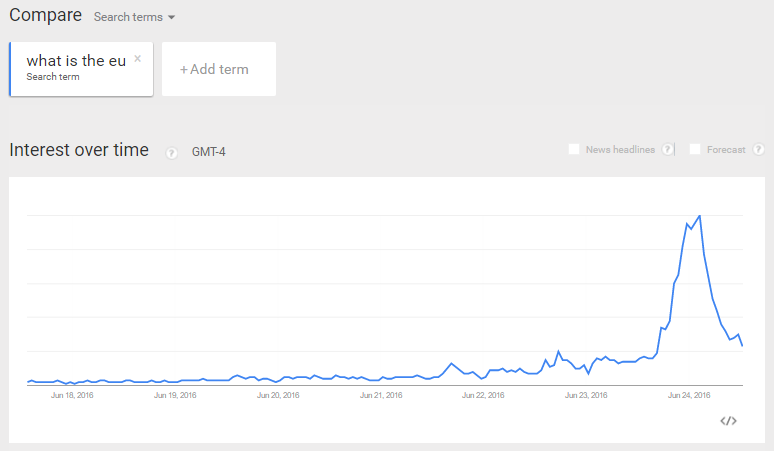 The sudden interest in “what is the EU” reflects a large group of Britons who didn’t fully understand what they were voting for or against in Brexit.
The sudden interest in “what is the EU” reflects a large group of Britons who didn’t fully understand what they were voting for or against in Brexit.
The spike clearly happens on June 24 — one day after the UK voted to leave the EU. As a comparison, that’d be like voting in the US presidential election and then looking up the policies of the presidential candidates. The question was pretty evenly spread across the UK as a whole, too.
It wasn’t just one area that wanted to know. 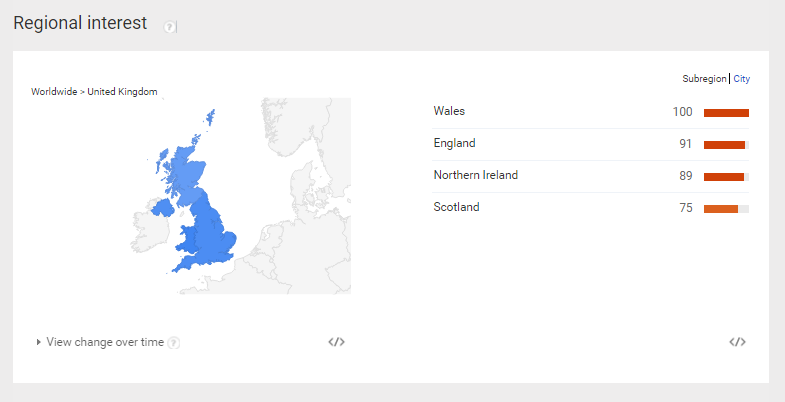 The economic impact of this vote is huge. It doesn’t just hit the UK and EU — it impacts the entire world.
The economic impact of this vote is huge. It doesn’t just hit the UK and EU — it impacts the entire world.
That’s because globalization has connected virtually every first-world market intricately, including the New York Stock Exchange. A change in the value of the pound also impacts currency relationships, investments, and interest rates around the world. In other words, this is one of the biggest financial decisions the world has ever made.
It theoretically has the power to plunge the UK into a recession. Why? Basically, the UK can now redefine its trade agreements however it’d like.
The European market is no longer united as the EU. Instead, it’s now the EU and UK. It also just got harder for non-naturalized citizens to work in the UK, not to mention the British citizens working abroad as well.
There’s now more complex rules and paperwork involved since the EU made immigration easier among member states. But people don’t vote on a referendum if they’re completely ignorant. Brexit has been world news for months, and it’s so important that it caused Prime Minister David Cameron to step down.
Voters definitely understood the gravity of the situation at least. So what were Britons really voting on?
Point #2: Brexit was about immigration
Boris Johnson — and much of the UK conservative party in general — seized the national spotlight with anti-immigration rhetoric.
They’re the party responsible for creating Brexit in the first place, actually. And as it turns out, their anti-immigration campaign caught on — at least compared to economics. 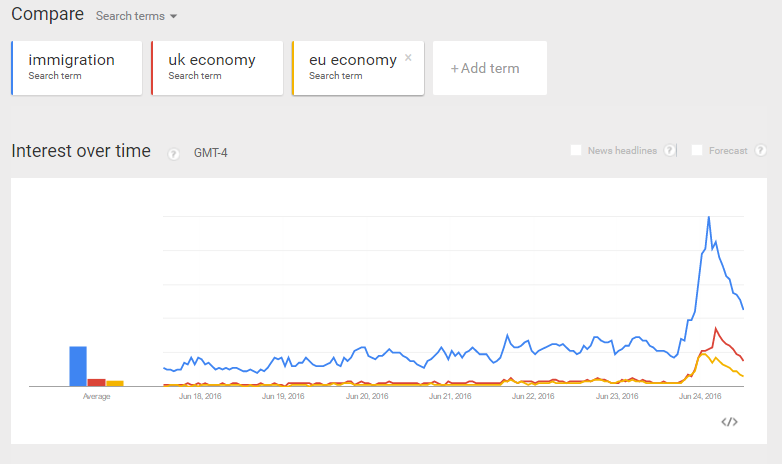 Again, this huge spike in searches comes after the Brexit vote.
Again, this huge spike in searches comes after the Brexit vote.
Polls were closed when people started looking up information about immigration, the UK economy, and the EU economy. Still, you can see that immigration was clearly the more popular search term in the week leading up to the referendum itself. 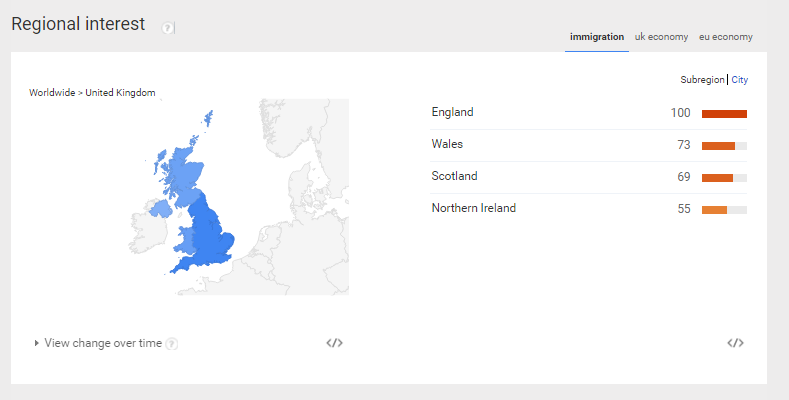 In stark contrast to our last point, the bulk of immigration queries came from England.
In stark contrast to our last point, the bulk of immigration queries came from England.
Wales and Scotland also seemed to care about immigration to some extent, but not so much Northern Ireland. So the British conservative party apparently did its job effectively. It looks like a substantial number of Britons voted on the basis of immigration, as opposed to economics.
With any luck, the British voters will get the immigration reform that they want. If they don’t, they could’ve damaged the world economy for very little (or no) reason.
Point #3: Brexit is bigger than football (soccer)
Right now, there’s a European soccer tournament happening called the UEFA Euro 2016. For short, it’s called the Euro 2016. But before we looked at this trend, we wanted to make sure it reflected information about the soccer tournament — not the value of the EU euro currency in 2016. The conclusion is clear: It’s definitely about the soccer tournament. 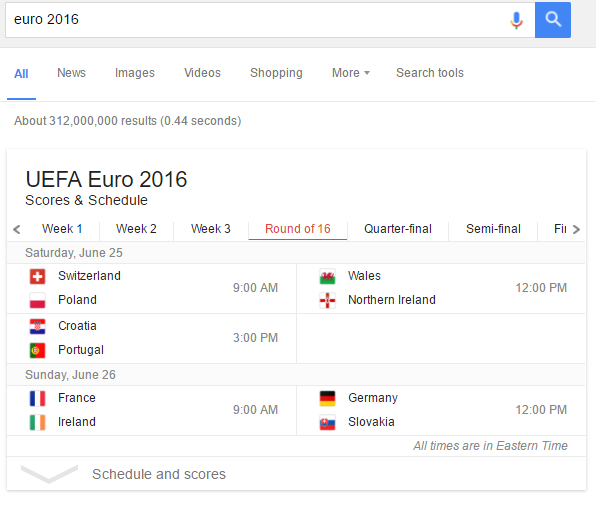 This is the EU equivalent of the MLB World Series. It’s a long tournament, and the entirety of Europe is invested in the outcome.
This is the EU equivalent of the MLB World Series. It’s a long tournament, and the entirety of Europe is invested in the outcome.
So how did searches for the Euro 2016 shape up against Brexit in the UK? 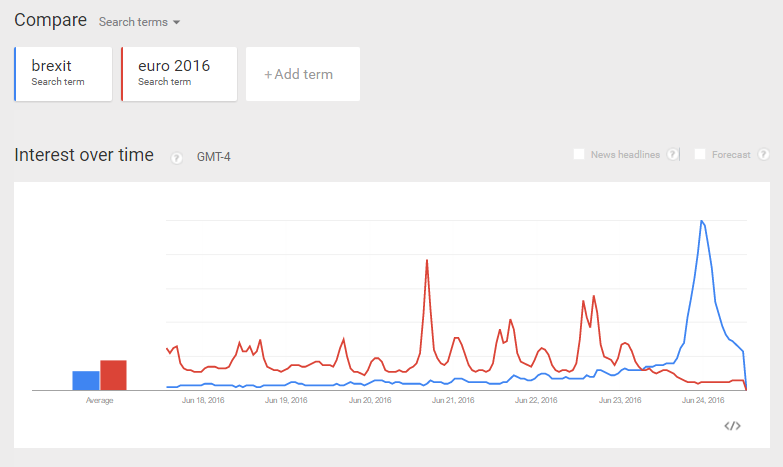 Interestingly, most British citizens wanted to know about Brexit the day of the referendum. And way more people wanted to know about Brexit’s results and impact on the day after.
Interestingly, most British citizens wanted to know about Brexit the day of the referendum. And way more people wanted to know about Brexit’s results and impact on the day after.
But not only did interest in Brexit spike — interest in the Euro 2016 plummeted. For a moment, one of the world’s most popular sports events took a back seat to a political and economic referendum. 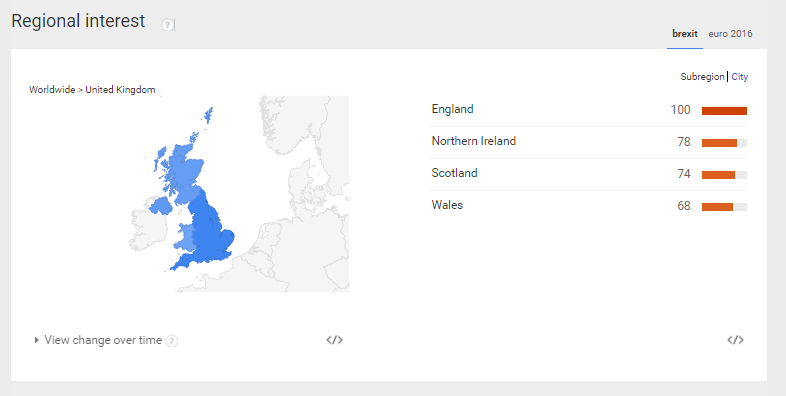 Searches for Brexit peaked in England more than the other three UK countries.
Searches for Brexit peaked in England more than the other three UK countries.
But the sudden interest completely eclipsed soccer for about two days. Maybe longer, depending on how the weekend games go.
Point #4: People want to move
Since Brexit is so controversial — the winning margin was razor-thin — some Britons are naturally looking to take their lives elsewhere.
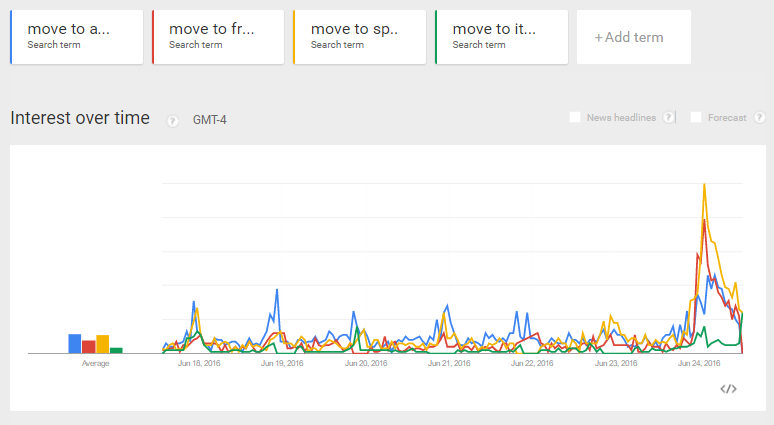 There’s a suddenly-huge interest in the UK to move to Spain, France, America, and Italy — in that order. There’s at least some level of the population that just wants out.
There’s a suddenly-huge interest in the UK to move to Spain, France, America, and Italy — in that order. There’s at least some level of the population that just wants out. 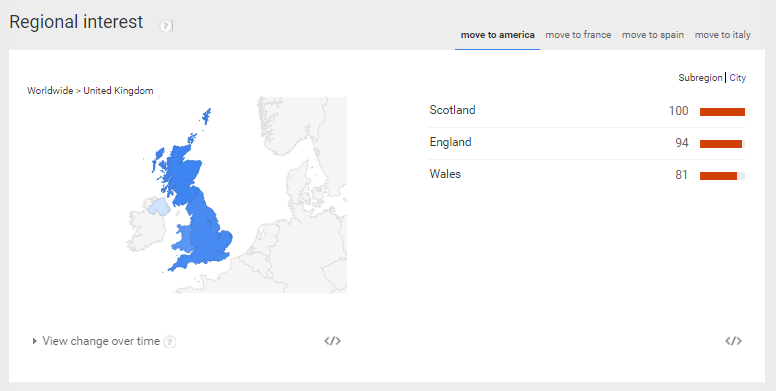 That population is fairly spread out throughout the UK, with Scotland leading the charge on many of those searches.
That population is fairly spread out throughout the UK, with Scotland leading the charge on many of those searches.
And speaking of the Scots…
Point #5: Scottish independence is back on the table
Scottish independence is always a hot-button issue in the homeland of William Wallace. In 2014, the UK held a referendum to vote on Scotland seceding, much like Ireland did in the 1900s (except Ireland did it through war). But that comparison aside, a lot of Scots want the Anglo-Scottish border to be a matter of international policy.
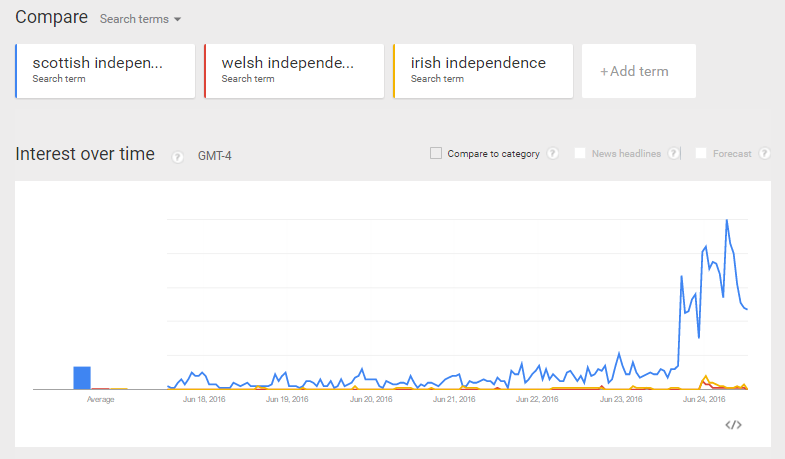 The Welsh and Irish are kind of on board, but not quite to the same extent. The spike in searches starts on the day of the referendum, and as far as Google’s data shows, the search volume is set to spike again. And of course, the biggest source of these searches is Scotland itself.
The Welsh and Irish are kind of on board, but not quite to the same extent. The spike in searches starts on the day of the referendum, and as far as Google’s data shows, the search volume is set to spike again. And of course, the biggest source of these searches is Scotland itself.
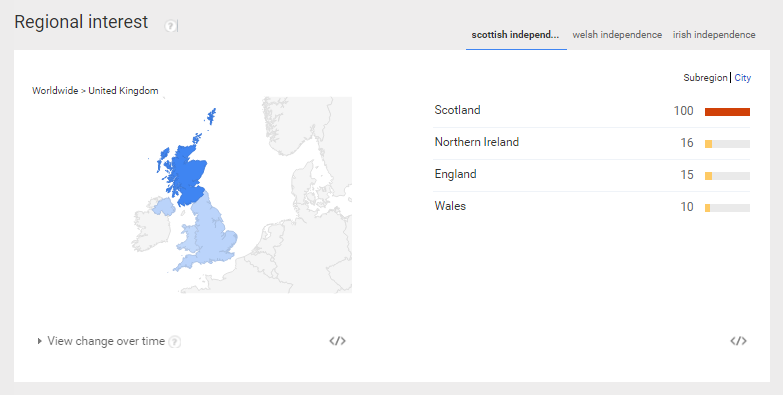 Outside of Scotland, not many other people really care about Scot independence (at least in the UK). Considering a 2/3 majority of Scotland voted to remain in the EU, the first Scottish minister — Nicola Sturgeon — says a new bid for Scottish independence is all but inevitable. And according to Google, that moment could be approaching quickly.
Outside of Scotland, not many other people really care about Scot independence (at least in the UK). Considering a 2/3 majority of Scotland voted to remain in the EU, the first Scottish minister — Nicola Sturgeon — says a new bid for Scottish independence is all but inevitable. And according to Google, that moment could be approaching quickly.
Looking for an all-in-one SEO audit tool? You’ve found it.
SEO Checker provides data on key metrics to give you:
- Complete SEO score
- Content Grade
- Site Speed Analysis
- and more.

Point #6: A sudden interest in nationalism
With so much interest in immigration, economics, and — to a certain extent — soccer, it’s no wonder that the UK is becoming more interested in nationalism as well. 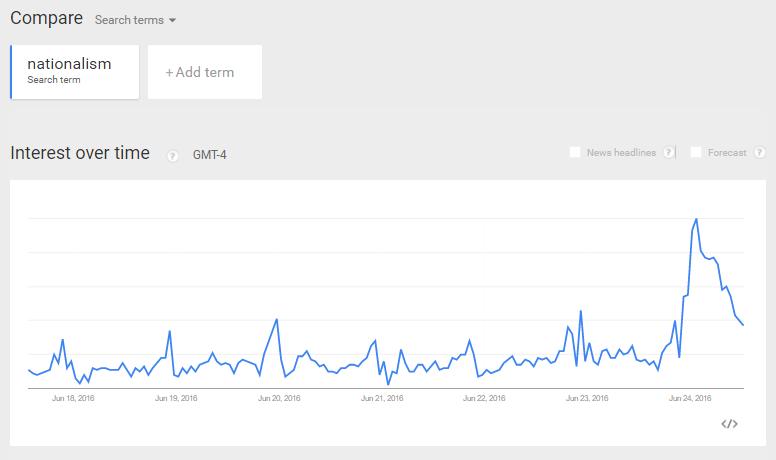 Nationalism is an extreme form of patriotism that includes pride in one’s country (which is great), feelings of superiority over other countries (which isn’t so great), and intense xenophobia (which is horrible).
Nationalism is an extreme form of patriotism that includes pride in one’s country (which is great), feelings of superiority over other countries (which isn’t so great), and intense xenophobia (which is horrible). 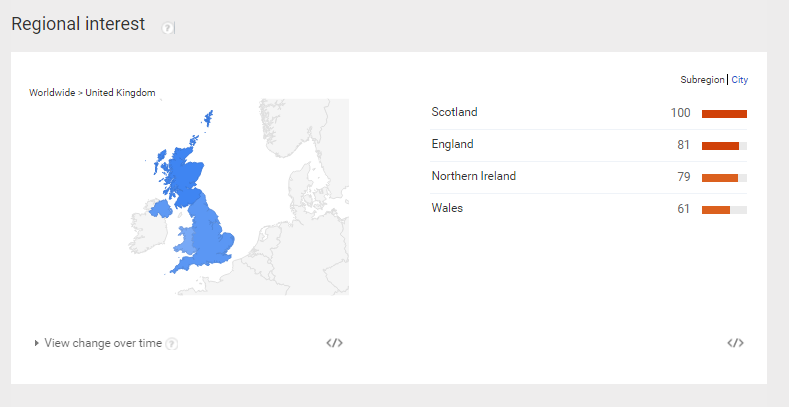 Searches for nationalism are much more common in Scotland than other UK member states.
Searches for nationalism are much more common in Scotland than other UK member states.
That’s probably because Scottish nationalism is tied closely to Scottish independence. But a spike in searches for “nationalism” in general — especially in relation to an immigration-related referendum — is concerning. According to most historians, a sudden wave of nationalism and ethnic tension (i.e, immigration) were two major contributing factors of World War I.
Interestingly, nationalism played a huge role in the rise of the Nazis as well. If you’re sensing an uncomfortable pattern here, so is every historian in the world. Hopefully, nationalistic ideology will cool off in the coming months and ease the tension between UK nationals and their political counterparts.
Nationalism has an historical reputation for spreading quickly, especially in Europe. It happened in the early 1900s, and it happened again in 1930s Germany. The EU (and United Nations) was created to prevent a world war from ever happening again.
With any luck, it’ll continue to succeed. But speaking of Nazis, let’s take a look at one final, weird search trend.
Point #7: Comparing Boris Johnson to Hitler
As mentioned earlier, Boris Johnson is a big force behind the push for Brexit referendum and UK secession.
He’s gained a lot of clout recently, especially since David Cameron has stepped down as prime minister following the Brexit vote. Johnson’s anti-immigration stance has apparently won the hearts and minds of a slim majority of UK citizens — except the ones who regret their vote — which stirred some images of a certain world villain’s views on non-Germans. 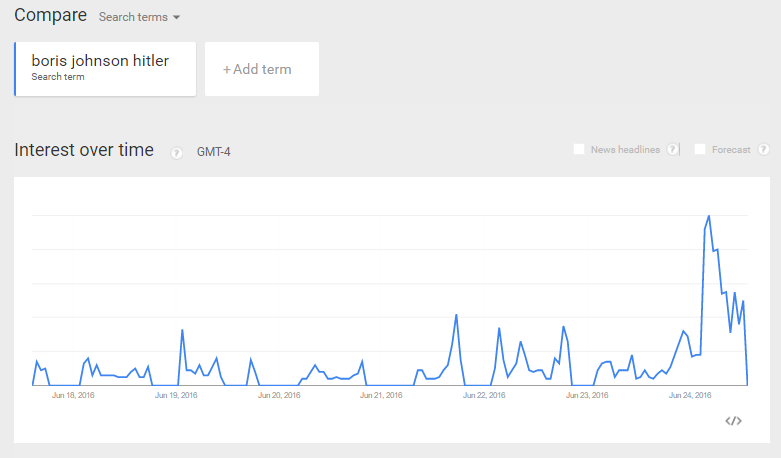 While comparing the modern UK conservative party superstar to literally the worst person who ever has (and possibly ever will) live is a tad extreme, there’s a definite spike in searches that tie the two men together.
While comparing the modern UK conservative party superstar to literally the worst person who ever has (and possibly ever will) live is a tad extreme, there’s a definite spike in searches that tie the two men together.
The search itself is coming from… 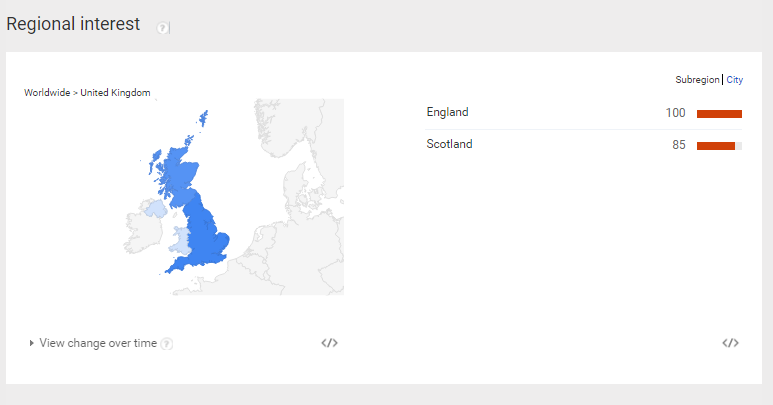 … England and Scotland, exclusively. That comparison reflects an interest in Britons who voted to stay in the EU and see Johnson as a very real, potentially violent threat to the future. However, this trend is probably a symptom of knee-jerk reaction, as opposed to sincere British belief.
… England and Scotland, exclusively. That comparison reflects an interest in Britons who voted to stay in the EU and see Johnson as a very real, potentially violent threat to the future. However, this trend is probably a symptom of knee-jerk reaction, as opposed to sincere British belief.
After all, people compare their ideological opponents to Hitler all the time. It’s called Godwin’s law. It happens online, like, every five or six seconds.
What Brexit search trends have you found?
Are you watching British search trends too? What have you found? Let us know in the comments!
-
 Trevin serves as the VP of Marketing at WebFX. He has worked on over 450 marketing campaigns and has been building websites for over 25 years. His work has been featured by Search Engine Land, USA Today, Fast Company and Inc.
Trevin serves as the VP of Marketing at WebFX. He has worked on over 450 marketing campaigns and has been building websites for over 25 years. His work has been featured by Search Engine Land, USA Today, Fast Company and Inc. -

WebFX is a full-service marketing agency with 1,100+ client reviews and a 4.9-star rating on Clutch! Find out how our expert team and revenue-accelerating tech can drive results for you! Learn more
Try our free SEO Checker
Boost your site’s search performance with our free SEO Checker. Analyze your website for optimization tips on titles, headers, content, speed, and more. Get a free report now to enhance rankings on Google, Bing, Yahoo, and beyond!

Table of Contents
- Point #1: People Make World-changing Votes Without All the Information
- Point #2: Brexit Was About Immigration
- Point #3: Brexit is Bigger Than Football (soccer)
- Point #4: People Want to Move
- Point #5: Scottish Independence is Back on the Table
- Point #6: a Sudden Interest in Nationalism
- Point #7: Comparing Boris Johnson to Hitler
- What Brexit Search Trends Have You Found?


How Is Your Website’s SEO?
Use our free tool to get your score calculated in under 60 seconds.
Try our free SEO Checker
Boost your site’s search performance with our free SEO Checker. Analyze your website for optimization tips on titles, headers, content, speed, and more. Get a free report now to enhance rankings on Google, Bing, Yahoo, and beyond!






